Drew Myron's Blog, page 5
December 31, 2024
Best Books of 2024
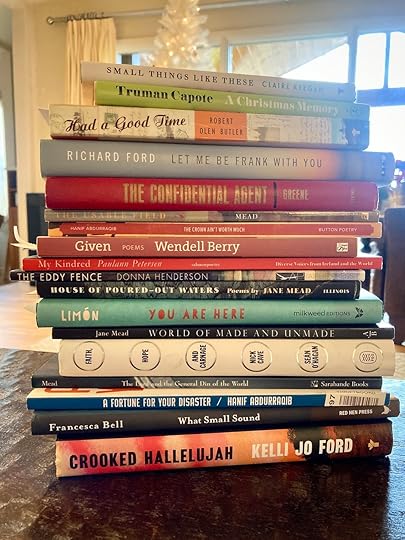
Happy New Year! Join me in welcoming a bounty of books to read, re-read, savor & share!
Is there a better gift than a book?
Sure — wine, sweets, and thrift store gems will always make me swoon, but give me a book and you’ve worked your way into my heart. This season, I’m feeling a swell of gratitude for good friends & good books.
Let’s look back to the best of the bunch (books, not friends).
I don’t track the number of books read, though I typically complete at least one book a week. Of those, here are the ones that have stuck with me (these are books read, not necessarily published, in 2024):
FICTION
Novels I keep urging everyone to read:
• Long Bright River by Liz Moore
• Demon Copperhead by Barbara Kingsolver
• Commitment by Mona Simpson
• The Wedding People by Alison Espach
A good but disturbing novel that I couldn’t put down:
• History of Wolves by Emily Fridlund. This family drama thrums with creepy yet fascinating tension.
Novels that left me entertained but conflicted:
Months after reading these novels, I can't stop thinking about the topics they raise: writing, race, access, appropriation.
• Yellowface by R.F. Kuang
• Victim by Andrew Boryga
Mystery series I gobbled up:
• Vera Stanhope novels by Ann Cleeves. Until recently, I was not a big fan of crime thrillers. But lately, I can’t get enough of the genre. In a series that spans nearly a dozen books, Cleeves is an expert at unwinding story and character with masterful restraint.
NON-FICTION
Most unexpected transformation of a punk rocker:
• Faith, Hope, and Carnage by Nick Cave
Delightful tales with a side of sad:
• Still Life with Remorse by Maira Kalman. An artist/writer turns family grief inside-out with quirky irreverence that soothes and surprises.
• A Christmas Memory by Truman Capote. In this slim book containing three stories about his childhood, Capote offers brilliant writing that reveals the tender oddity of an unusual friendship.
POETRY
Poet whose books I can’t stop buying: Jane Mead
Though she died in 2019, I only recently discovered the work of poet Jane Mead. At every turn I find another book I didn’t know I needed.
Poet whose work I wish to inhabit: Mary Ruefle
A Little White Shadow, a small thin book published in 2006, kicked off a world of erasure poems. Yes, there were others before her (and a great many since) but Ruefle really amped the form.
Poetry books I keep close and return to often:
Given by Wendell Berry
The Trees Witness Everything by Victoria Chang
Hush by Rosemerry Wahtola Trommer
The Way It Is by William Stafford
Words Under The Words by Naomi Shihab Nye
QUESTIONS:
• Where do you get your books?
I am committed to supporting the work of writers by buying their books — but I read a lot and gotta pay my electric bill too. To that end, I obtain books in a variety of ways, namely at independent bookstores (Powell’s City of Books, Klindt’s Booksellers, and Bart’s Books are my favorites); at used bookstores (Artifacts: Good Books & Bad Art and Thrift Books are my top picks); and for poetry I purchase directly from the publisher because these are often small presses without the resources to get product placement at mainstream outlets.
And, firstly and lastly and always, I borrow books from my local library — where anyone can read books for absolutely free! Isn’t that a wonder?!
• What’s your best book of 2024?
* * *
The world turns on words. Thank you for reading & writing.
• If you know someone who might enjoy this blog — please share.
• If you want to read more — subscribe for free.
• If you are here, reading this now — thank you!
December 24, 2024
The Work of Christmas
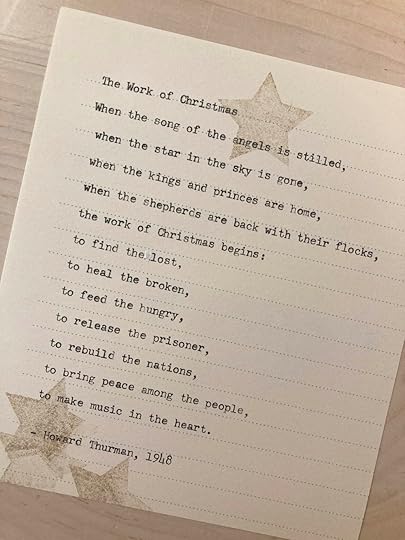
Hello Dear Reader,
Tinsel glistens, carols ring, and gifts sit wrapped and ready. Now, the busy of Christmas comes to its crescendo, followed by the quiet dim of a holiday glow.
In this rush and release, I turn again to one of my favorite poems of the season: The Work of Christmas by Howard Thurman. *
Written in 1948, this poem remains as powerful and relevant as when it was penned 76 years ago.
Howard Thurman was a professor, pastor, and civil rights leader. Born in 1899, he founded the first major interracial, interdenominational church in the United States, was the first black dean at a mostly white American university, and served as mentor to scores of students, including Martin Luther King, Jr.
Yet, Howard Thurman remains widely unknown. The activist was not boastful or loud. He believed real change was internal, individual, and often quiet.
“There must be always remaining in every life,” he wrote, “some place for the singing of angels, some place for that which in itself is breathless and beautiful.”
Colleagues and scholars have long praised Thurman’s work and heart.
“He gently and powerfully moved through the world in a spirit of grace, dignity, and humility,” says Walter Fluker, a professor at Boston University, where Thurman served as dean.
With grace, dignity and humility — the spirit of Christmas shines on.
With warm wishes to you in this season of darkness & light.
— Drew
* My other favorite seasonal poem is: When Giving Is All We Have, by Alberto Ríos.
* * *
The world turns on words. Thank you for reading & writing.
• If you know someone who might enjoy this blog — please share.
• If you want to read more — subscribe for free.
• If you are here, reading this now — thank you!
-
December 12, 2024
Thankful Thursday: Finding Song
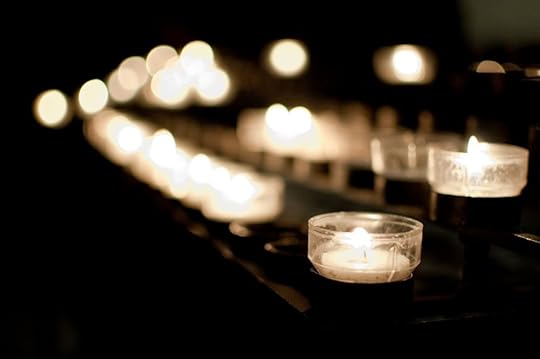
Photo by Pedro Alonso, courtesy of Creative Commons.
I'm not a poet but I’m trying to understand awe.
— Cecilia Fischer, The Ocean Foundation
Long before dawn, the roosters call. A repetitive caw that rattles and gnaws, then becomes, like so many things — bird chatter, dog barks, thumping bass, an engine’s roar — a background to life.
Sometimes you grasp for any small thing, a tether to something stronger, bigger, better than the self.
When a young woman talks to you plainly, as if reciting the soundtrack of your inner life, you lean in close to catch every word:
Keep a sharp focus on the contents of your mind, she says. The words you hear, think, and speak will support or thwart you.
In a clattering cafe, far from the thrum of holiday cheer, you hear the distant threads of a familiar song. Silent Night calls you closer. You reach across a table, ask another, Do you hear it, too?
Or, in the dim light of evening chatter, above the twinkle of a crumbling courtyard wall, you hear The Drummer Boy. The rump-a-pum-pum is faint but you crawl along the soft slow beat.
In the morning, church bells ring with You Are My Sunshine, and a chord pulls within you. You understand now that this is the most reverent song you have ever heard.
Inside, you step lightly toward the steady hiss of candles burning. This, too, is song. Heart to throat to eyes, a gentle welling reminds you: every day holds the holy.
* * *
It’s Thankful Thursday, a weekly pause to express appreciation for people, places, things, and more. Attention attracts gratitude, and gratitude expands joy. Please join me.
What are you thankful for today?
* * *
small things
the world is full of glass
unpack slowly
shake petals
serve tea
give wide starts
live among psalms
pull thin light
stand tall
give thanks
— Drew Myron
November 26, 2024
Question on a Tuesday
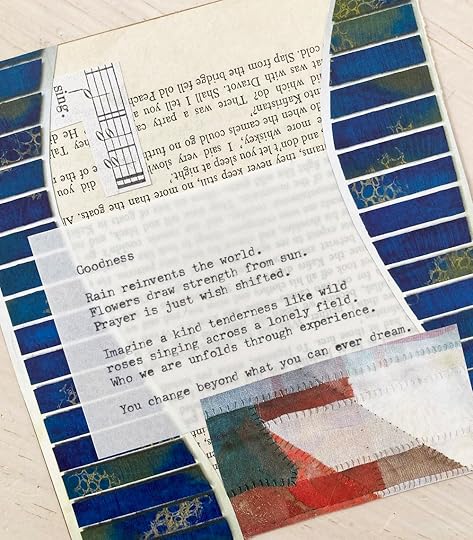
GOODNESS
Rain reinvents the world.
Flowers draw strength from sun.
Prayer is just wish shifted.
Imagine a kind tenderness like wild
roses singing across a lonely field.
Who we are unfolds through experience.
You change beyond what you can ever dream.
— Drew Myron
QUESTION:
What is unfolding, and how have you changed?
I’d love to hear from you. Send light, write!
* * *
The world turns on words. Thank you for reading & writing.
• If you know someone who might enjoy this blog — please share.
• If you want to read more — subscribe for free.
• If you are here, reading this now — thank you!
November 11, 2024
Escuchar
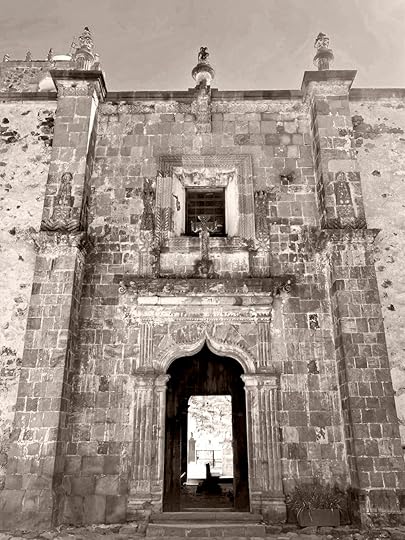
We drive just 35 kilometers to another time, another place, another world within us.
San Javier is a town of just 150 people, though we see only a few along the stone streets, standing in the shade of lime trees, in the doorways of homes and small cafes with tables and chairs beneath thatch roofs.
It is the church we have come to see. Maybe it is the oldest, the tallest, the most beautiful, the most something of somethings that I can't recall. The details rarely matter.
At the entry, a man with a soft voice and gentle smile ushers us in. The church was built in 1699, he says. We are alone here, nodding in awe and repeating his words in whispers.
I am not looking for god. But time holds reverence and attention is the currency of care.
He shows us all the places god would live: the diminutive wood closet for confession, the baptism basin made of smooth marble remarkably unblemished after hundreds of years. The oil paintings above the altar, dark with time, with repetitive prayers. He pauses at each square of art, points one-by-one to say the name. I do not know these saints, these ways of adoration, but I nod along, feign a following I wish to feel.
I am not looking for god — or I am, by default, always searching for something. It’s more that I am seeing beauty in the details: thick walls that cool our weariness, the solace of hushed words, the way the man mixes both Spanish and English and when I comment on his skills — how did you learn English, I ask — his smile is soft as he points to his ear, “escuchar,” he says.
After three months of Spanish lessons, this is one of the handful of words I know (and love): escuchar, to listen.
Even saying the word produces a lovely soft sound: ehs - koo - chahr
Hear the beauty of the word, here.
This church, this gentle man with four generations planted in this remote desert place, shows us every small thing we need to know.
Later in the day, after hours of oven heat, the world feels loud and full, bustling and busy. I head to the sea. I long to cool off but mostly I wish to slip into a long pull of plunging quiet.
The next day I wake early to an orange sky that turns the morning pink. The roosters have already begun their announcements, followed by dogs, by birds, by cars, by the crackles of day. The day barges and enlarges, and I listen for the hush.
Escuchar, escuchar , escuchar.
October 29, 2024
Fast Five with Donna Henderson
 “Poetry and psychotherapy are about ‘discovery’ and that requires me to become deeply curious about our experience of humanness — our wounds, longings, losses, regrets, and hopes.”
“Poetry and psychotherapy are about ‘discovery’ and that requires me to become deeply curious about our experience of humanness — our wounds, longings, losses, regrets, and hopes.” — Donna Henderson
Welcome to Fast Five, an occasional series in which I ask my favorite writers five questions as a way to open the door to know more.
Donna Henderson is a rare blend of creative accomplishment. She is a poet, writer, artist, singer, songwriter —and psychotherapist. Rooted in the arts, she is author of four poetry collections, two of which were named finalists for the Oregon Book Award. Her latest book, Send Word, published in 2022, is an evocative combination of poetry, art, and design.
Donna lives in Maupin, a town of 500 people situated along the Deschutes River in north-central Oregon.
1.
Why write?
I’m not sure I could have answered this question for the first few decades of my writing practice (that is, not with any answer that would not embarrass me to be connected with now!); all I knew was that I felt impelled to somehow, for (I understand now) the way writing organized and grounded something in me, from the very moment I began to be able to write words.
Writing let me feel seen in a family and a world at large in which I felt essentially unseen. I felt loved appreciated, to be sure, but not seen. And it wasn’t that I experienced writing as a way for me to be seen by others, I hasten to clarify: as a child, I didn’t share my writing anyway, and it wasn’t my purpose to. It was that writing gave me a way to hear my own voice, to register my own responses to the world (just as painting and drawing, which I also did from childhood, offered ways for me to see my own seeing). Like that, writing made it possible for me to see me.
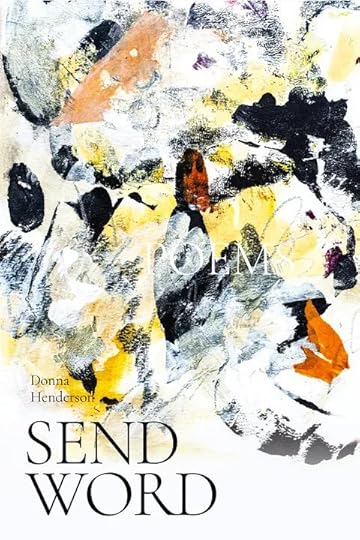
Then, in 1975, as a student at Oregon College of Education (now Western Oregon University), I enrolled in a class in Craft of Poetry from George Slawson, in which I had a profound experience with language that I am still dazzled by, grateful for, and continue to be led and informed by in my poetry practice these 50 years hence. I remember that I was trying to render into a poem the experience of both being part of, and observing, women in the shower room after a PE class, when suddenly I felt language itself take over, the words as they arrived (“skin”…“steam”) plunging me more deeply into the pure experience and wonder of the moment than before language had been engaged. Such that the poem that resulted (slight as it was, I still like it!) was a record of an experience of that: of an experience of wonder and discovery, intensified and made more intimate by the engagement of language.
Which is when and why I felt in love with poetry, which has been my primary writing practice since (though the purpose of my prose writing is the same): not as a means of self-expression (whether that be of emotions or opinions), but rather an engagement with language that engages me more deeply with wonder and with the senses, to see what there is to be made and to be understood by way of that engagement.
2.
You are an artist, singer, songwriter, poet and psychotherapist. What came first, and how did you develop and hone your skills?
Art came first, and was always there, and I credit my mother with that: she had five of us in quick succession, and while I experienced her as perpetually overwhelmed, and seeming to be more distracted than gratified by child-raising, creativity itself was her highest value (she herself was never happier than when writing, painting, playing the piano or dancing). So while we were expected to clean our rooms and help keep the house clean in general, the one place that never had to be cleaned up was the huge art table in the basement playroom, nor anyplace else that had to do with creative play.
Similarly, writing was just something we did in my family, (both my parents were journalists), so I suppose I started writing when I was given a diary at age five or so. And music was always a thing; mom played the piano, and both my parents loved music of all sorts, so I grew up listening and singing to music: it was just part of the water I swam in. So I really don’t remember a time that music, writing and art weren’t a part of my life, and I was fortunate that the public schools I attended valued and encouraged all of these also— I had some wonderful teachers! But I do think it is my mom to whom the most credit has to be given, and which was persistent throughout her life. I remember her unhesitating encouragement to me as an adult, when I was trying to decide whether or not to fork out the funds for a piano of my own (not really sure how ready I was to commit to actually playing it). “Of course you should buy it!” she told me. “Creativity, honey, it’s the most important thing.”
Later (and with each of the arts), I developed my skill by seeking out experiences of various kinds that would help me to learn the specific skills I wanted to learn. With poetry, I received that by attending summer writing workshops for many years, then an MFA (I graduated from Warren Wilson Program for Writers in 2006).
More recently, after languishing for many years, my visual art has been experiencing a happy renaissance since the year of covid quarantine, when I started taking classes on Zoom with Eugene, Oregon artist Zoë Cohen, who has been an important mentor and teacher since. In fact, the two of us are going to co-teach a class at Sitka Center for Art and Ecology in the fall of 2025, involving language and art practices.
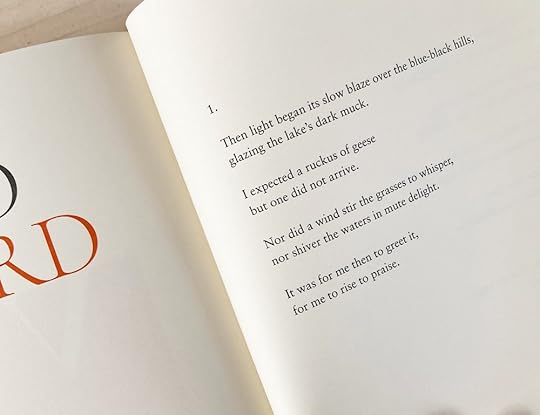
Excerpt from title poem, Send Word, by Donna Henderson.
As for psychotherapy: I have always enjoyed listening to others, and especially to (and for) how people cope with difficulty and make meaning and connection in their lives. So it kind of felt like a natural, I guess, to choose a profession based on that, and I went about learning to do it in the usual ways: school, graduate school, supervision, licensure, and (most importantly) a lot of great mentorship, continuing ed, and a wonderful network of wise colleague-friends, over the almost 40 years since I began practicing.
The practice itself of psychotherapy actually feels very much like simply another genre of creative work, in the way I practice it anyway. Because while poetry is commonly thought of as being about “self-expression,” and the objective of therapy as being “self-improvement,” I actually understand both poetry and psychotherapy to be about “discovery.” And that requires me to become —and to remain—deeply curious about our experience of humanness — our wounds, longings, losses, regrets, and hopes — with my clients, and to engage in that curiosity through language. And while psychotherapy typically begins with the stories clients carry about who they are and why they are that way, the actual process of therapy involves inviting clients to step off from there into what is unknown and unseen: to become more curious than certain themselves.
So I guess that you could say that “seeing and being seen” is what art, writing and psychotherapy all engage in…and it’s why I got into all of them!
3.
You co-founded
Airlie Press
, a collective poetry publisher. Why? And what have you learned through the process?
I’ll be briefer with this one (you’re welcome!): In the early 2000s, I’d been a member of a long-running writing group, most of the members of which had manuscripts of poems “circulating” (looking for a home).
But books of poetry are particularly difficult to place, since poetry does not make money for publishers, so there are fewer presses that publish it than that publish other genres. Because of that, a manuscript of poems, no matter its quality, has something like a 1% (or even less) chance of being accepted for publication by a press. On top of that, for poetry presses to even cover their costs of publication when they are unlikely to make much of a return, they charge a reading fee of around $25 for submissions. Given the number of presses one ought to submit to to increase the chances of an acceptance, a poet can (and we each did) easily spend $500 a year on submitting, with close to no chance of a bite.
So (to make a longer story much shorter) one of us proposed dedicating our time and funds instead toward starting a collective, shared-work press run by poets, based on the model of some others (Alice James, and Sixteen Rivers Press in particular), beginning with publishing each of our own completed manuscripts, and then opening to submissions by other poets who (if their manuscripts were accepted) would be willing to make a 3-year commitment to the work of the press.
It was a tremendously gratifying venture, and while I am no longer involved in the editorial work of the press (I currently serve on the Board of Directors) , I could not be more proud of how the press has thrived — it’s going on 17 years now, and continues to produce beautiful books of poetry (I think something like 40 titles to date), representing an increasingly diverse array of poetic voices.
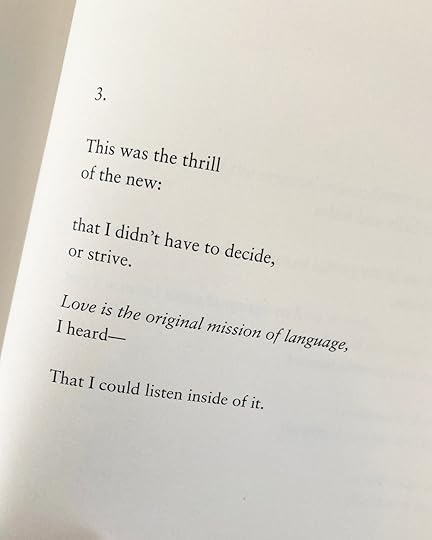
Excerpt from title poem, Send Word, by Donna Henderson.
Perhaps the biggest thing I learned from the experience was that the editors at Sixteen Rivers (who mentored and advised us) were right when they warned us not to try to start a press with fewer than seven initial members. Only four of us were up for it, so we decided to go ahead with it anyway and…well, burnout of the original members from active involvement was ultimately unavoidable, I think. A press is a LOT of work! I would not try it again with fewer than six compatriots, but oh what a splendid vision and venture it was, and (thanks to the dedicated work of the member-poets who have kept it going) and is!
4.
What’s the best writing advice you’ve received (or given)?
Here are three pieces that come to mind: one is from one of my mentors in graduate school, Karen Brennan, and is particular to poetry: “Remember,” she said, “poetry is not made out of ideas, poetry is made out of lines.” which advice keeps me grounded in letting language, and not concepts, lead.
Another great piece of advice comes in the form of the poem, Berryman by W.S. Merwin.
And the third? In his book Mere Christianity (I think that’s where I read it) C.S. Lewis wrote, “I pray not because it changes God; I pray because it changes me.” That’s why I write, and what I urge other writers to focus on: the practice and the process, not the product. Paradoxically, the more I remember that, the truer (therefore better) my work becomes.
“Creativity, honey, it’s the most important thing.”
5.
I’m a word collector, are you too? What are your favorite words?
Here are a few: mimulus, gloom, cluster, pandemonium.
Also antidisestablishmentarianism, though only because it is (or was, when I was a child) the longest word in the dictionary, and because it gave my father endless delight that I could spell it (as I was often called on to do) when I was five, following his fervent tutoring to that very end.
October 9, 2024
Thankful Thursday: Flickering
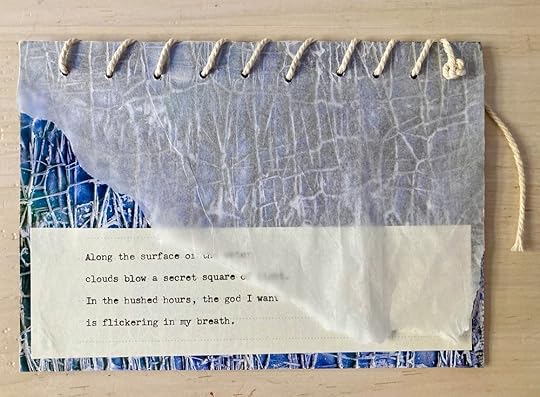
Flickering
Along the surface of the water
clouds blow a secret square of light.
In the hushed hours, the god I want
is flickering in my breath.
— Drew Myron
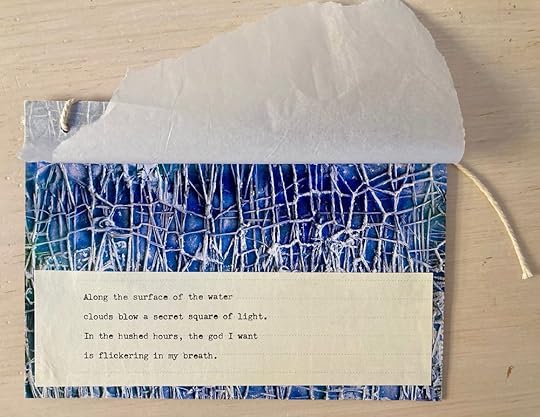
Flickering, a poetry collage by Drew Myron
In a way, it seems we’re all wading rough waters — sloshing through the thin layer of over / under, true / false. The sea is shifting and in this long stretch, I’m reaching for reclamation and a gratitude that grows.
Please join me for Thankful Thursday, a weekly occasion to express appreciation for people, places, and things. Attention attracts gratitude, and gratitude expands joy. In this storm, we need glimmers of light.
Thank you for spending your time with me, for keeping me accountable, appreciative, and grateful for things large and small.
What are you thankful for today?
October 2, 2024
Strike a Match
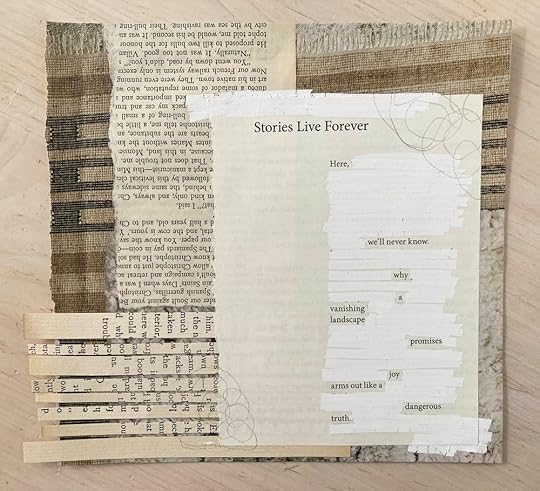
Stories Live Forever by Drew Myron
Tracy is making big, bold paintings.
Beth is organizing a book-in-progress.
Kathy is mastering a foreign language.
Suz just won a poetry contest.
My friends are thinking, feeling, making, creating. It’s enough to fill you with encouragement, and also shrink you in comparison (the thief of joy).
Get a project, a friend suggests.
It’s your fallow season, consoles another.
Yes and yes, both make sense. I love the focus of a project, such as the Poetry Postcard Fest, and Sweet Grief, and Weilworks collaborations.
But I also value the quiet season, a time of puddle and mull. I’m betwixt and between. Not here or there, but in the search and on the way.
“What is the meaning of life?” writer Virginia Woolf asked in To The Lighthouse.
“The great revelation perhaps never did come,” she wrote. “Instead there were only little daily miracles, matches struck unexpectedly in the dark.”
Yes! And so, as I wait, I still make.
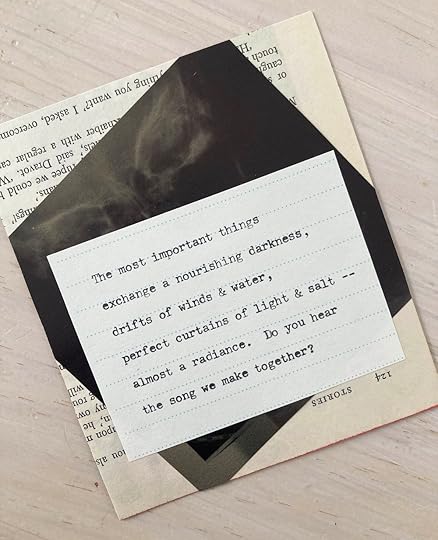
The Most Important Things by Drew Myron
It’s advice that writer Sarah Cook offers, too:
“You have enough time to write,” she urges in For the Birds, a Substack newsletter.
“Short, frequent instances of contact with your creativity are extremely valuable. The modern average attention span is 40 seconds. FOUR. FUCKING. ZERO.
Okay then! Write for 40 goddamn seconds. Write for EIGHTY seconds, if you’re feeling really saucy. . .
If you wish you had more time to write, start with anything more than nothing. Anything more than nothing is good! This advice can be applied to any creative endeavor / most goals.”
With that energy, I’ve been taking short bursts of time — 10 minutes, an hour, an afternoon — to make a medley of image and words, texture and color.
Maybe it’s collage, maybe it’s poem. Maybe it’s a creative exercise, or just a good stretch. But mostly, it feels good to strike a match and see what burns.
What are you making?
* * *
The world turns on words. Thank you for reading & writing.
• If you know someone who might enjoy this blog — please share.
• If you want to read more — subscribe for free.
• If you are here, reading this now — thank you!
September 26, 2024
Thankful Thursday: Dear Something
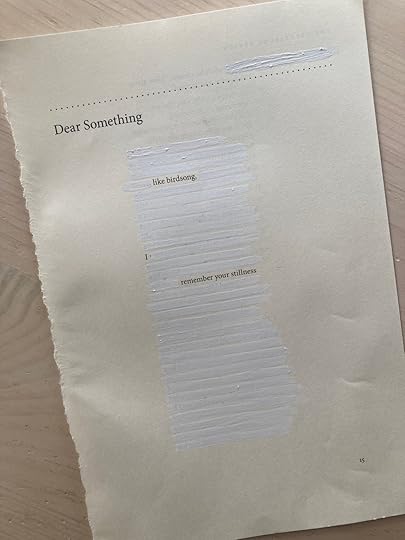
Dear Something, by Drew Myron
Dear Something Like Birdsong,
I remember your stillness.
* *
Today the memory of you is distant.
A throat clears in the next room. A jaw clicks open.
A shoulder tightens. You are barely a hum.
* *
Suddenly, it is fall, the waning light of a going season.
You clung to summer. You were a raft on a lake, floating
through endless light. That’s memory, isn’t it, always
in long, warm light. But you weren’t sentimental, did
not give in to hugs or hoorays. You kept your own sort
of distance, mix of sharp tongue and darting hands.
You were a subject, like a season, quickly changing.
* *
Some days I forget to miss you.
Some days I see you in a painting, or in a scattering of thin clouds.
Sometimes I feel you in a photo that is not even you,
yet there you are — all the voices of my life —
in a soft song that will always play.
* *
Dear birdsong and busy mothers.
Dear early dawn and determined dads.
Dear hum and buzz and steady stillness.
I am fine.
* *
It’s Thankful Thursday, a weekly pause to express appreciation for people, places, and things. Big or small, pea-sized or profound, attention attracts gratitude, and gratitude deepens joy.
Please join me. What are you thankful for today?
September 19, 2024
Back to School: Campus Novels
Leaves are turning, air is cooling, and I’ve packed away my summer skirts. This means only one thing: It’s back to school season, and I can’t get enough of the campus novel genre.
Academic life can be a such an intense experience. A college campus, boarding school, or even run-of-the-mill high school is a wonderfully charged setting for themes of ambition, power, sex, longing, love, and other formative encounters. And fiction around this theme can display great internal and psychological drama, along with a fevered insider view.
Let’s go back to school! Hit the books with my favorite Campus Novels:
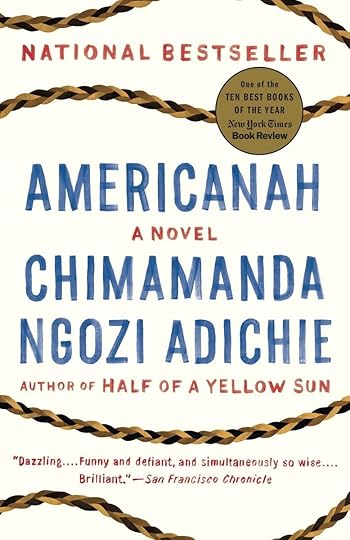
Americanah by Chimamanda Nogzi Adichie
Americanah, a novel that is both is absorbing and enlarging, tells the story of a young Nigerian woman who immigrates to the U.S. to attend university. Published in 2013, Americanah was awarded the National Book Critics Circle Award for fiction.
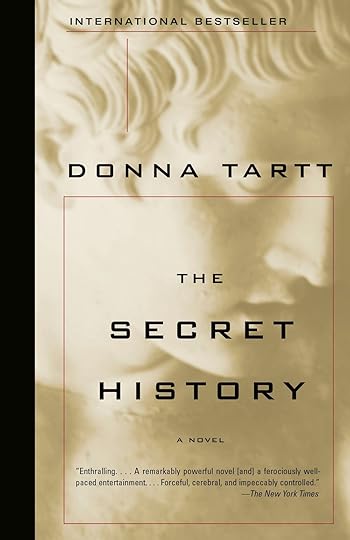
The Secret History by Donna Tartt
Published over 30 years ago, this novel is the first of Donna Tartt’s succesful works (followed by The Little Friend, The Goldfinch, and more). The thriller-mystery gives a moody mix of insular and sinister as it follows a clutch of students attending an elite New England college.
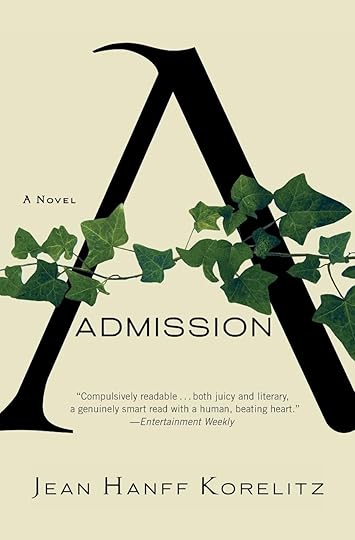
Admission by Jean Hanff Korelitz
An entertaining peek into the morally complex world of the college admissions process. If you like this novel — as I did — Korelitiz continues the insider theme, this time on writing and publishing, with The Plot and The Sequel (to be published in October 2024).

Russo is a master of academia insight with a good dose of wry. With a mix of humor and pathos, this novel delivers my favorite story combination: frustrated writer and university life.
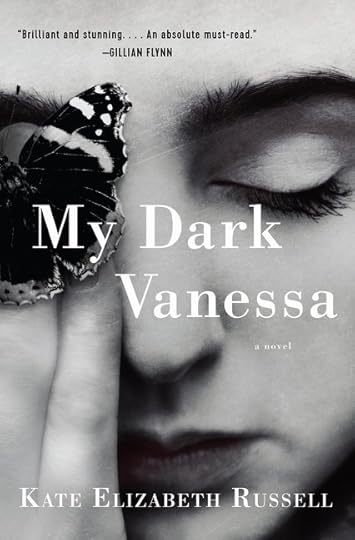
My Dark Vanessa by Kate Elizabeth Russell
This 2020 novel is a dark and disturbing exploration of the psychological dynamic between a teenage girl and her magnetic and manipulative teacher. It's an intense and compelling story delivered with the steady hand of masterful writing.
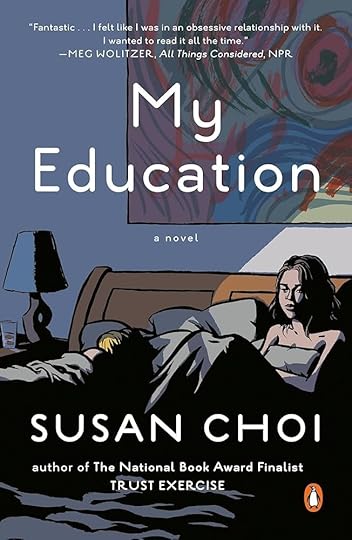
If you like the student-seduced-by-professor genre, this 2013 novel delivers an erotic, and chaotic, ride. Choi revisits the academic theme again with Trust Exercise, published in 2019.
Your Turn: What am I missing? There are loads of books in the campus novel genre, and I’m in the mood for more! What should I read next?
* * *
The world turns on words. Thank you for reading & writing.
• If you know someone who might enjoy this blog — please share.
• If you want to read more — subscribe for free.
• If you are here, reading this now — thank you!



